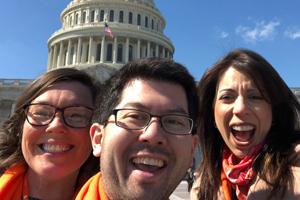Learn more about becoming a living donor. #TransplantsForAll

Make your National Donate Life Month Gift Today
With your support, we'll never stop fighting for equal accesss to quality care — especially lifesaving transplants for all.
Contributions from generous people like you keep NKF in action on behalf of families facing kidney disease in communities across the country. Please don't wait - make your special gift today.

Kidney disease or transplant can be scary. Speak with a specialist who will answer your questions and listen to your concerns. Contact NKF Cares at 855.NKF.CARES (855.653.2273) or nkfcares@kidney.org.
Speak with a peer mentor who shares your experiences with dialysis, transplant or living kidney donation.
Spring Clinical Meetings
The Spring Clinical Meetings (SCM) is NKF's premiere educational event designed for the interprofessional kidney health team. SCM presents a unique opportunity for busy renal health care professionals to explore innovation, research, and best clinical practice within nephrology.


